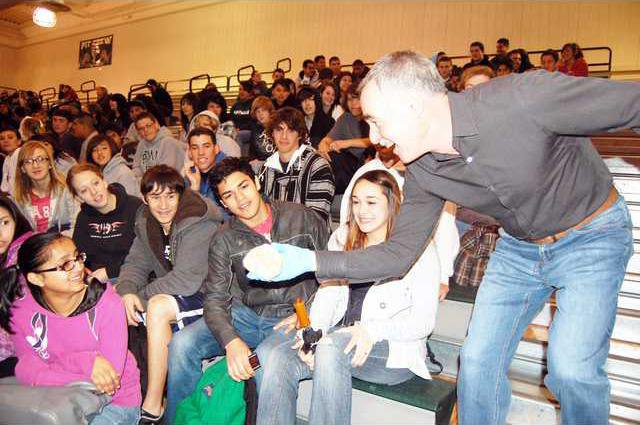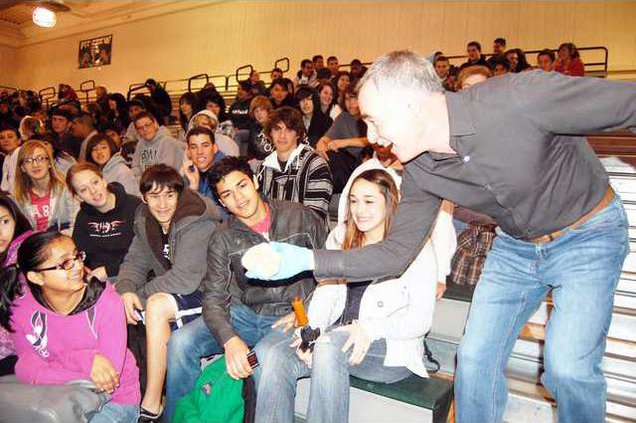Good parents always tell their kids not to smoke and while most of the time it works, their advice can sometimes go in one ear and out the other.
But Victor DeNoble, a former research scientist for Phillip Morris Tobacco, had a good idea when he tells his story… he pulls out a preserved human brain of a 65-year old man who died from lung-cancer in the 1980s.
The human brain gained the attention of hundreds of students Tuesday at Pitman and Roselawn high schools when DeNoble was in town do deliver his story and kick off Kaiser Permanente’s “Don’t Buy The Lie” anti-tobacco use program.
Stanislaus and San Joaquin high school students now have the opportunity to make a difference in the war on tobacco. Kaiser Permanente’s “Don’t Buy The Lie” anti-tobacco use program offers teens the chance to design anti-smoking ads for display on billboards across both counties.
DeNoble’s story hopes to serve as an inspiration for students to submit artwork, as well as take a step back when offered their first cigarette.
In the early 1980s Victor DeNoble worked for tobacco giant Phillip Morris. He was hired to find a chemical that would replace nicotine with a “safe” alternative. At the time there were no formal studies to reveal tobacco’s effect on humans. Nicotine, tobacco’s addictive chemical, was declared safe for consumption by tobacco companies.
That is until DeNoble testified at Congressional hearings for big tobacco in 1994. DeNoble was considered the first effective whistleblower against big tobacco.
After DeNoble was hired he began conducting experiments on rats and monkey and discovered that not only was nicotine highly addictive, it physically changed how the brain works.
“When nicotine is taken into the bloodstream it moves through the heart and into the brain, releasing increased levels of dopamine from the ventral tegmental area of the brain,” explained DeNoble. “Dopamine creates temporary feelings of pleasure, and the more you smoke the more your brain is trained to want that cigarette because you get more dopamine, it physically changes the way y your brain works.”
His story goes on to explain how he was fired from Phillip Morris for his experiments and corporate cover-ups ensued after he revealed to Phillip Morris that he had found a “safe” chemical alternate for nicotine. Much of DeNoble’s evidence was stolen by an attorney and sold back to big tobacco.
Years later DeNoble was contacted by the FBI and, with other pieces of evidence, he decided to testify against big tobacco. He and his wife were held in a secure warehouse for seven weeks under protective custody before his powerful testimony was revealed.
DeNoble has told his dramatic and jaw-dropping story to nearly 400 schools a year over the past 16 years, an estimated 300,000 students a year. But he made it clear he is not telling students what to do, he probably doesn’t have to. His story appears to be making an impact. Kaiser Permanente completed a seven-year study in which students from schools that DeNoble appears at have a 16 to 20 percent lower smoking rate.
“I never get tired of doing this because I know it’s making a difference. I hear from students who saw my presentation seven years ago and they tell me they never smoked because they learned so much,” said DeNoble, who has never smoked himself, although his parents did.
Billboard contest entry forms have been distributed to local high schools and are posted on www.kp.org/centralvalley. Entries must be submitted to teachers by March 25.
The grand prize winner will receive an Apple iPad and runner-up winners will each receive a portable eBook reader.
Last year’s winning billboard message, “Sometimes Things Are Better Broken,” was created by Juan Gomez, a senior at Grace Davis High School in Modesto.
For more information contact Fayette Reynolds with Kaiser Permanente at 476-3340.
To contact Jonathan McCorkell, e-mail jmccorkell@turlockjournal.com, or call 634-9141 ext. 2015.





